Organisational Goals and Team Dynamics
VerifiedAdded on 2020/11/12
|16
|5279
|73
AI Summary
This assignment delves into organisational goals, team development, and leadership composition. It covers various theories and models such as Tuckman's stages of group development, Handy's model of organisational culture, and path-goal theory. The assignment also discusses the significance of motivation tools in achieving organisational success and strategic alignment. It provides a comprehensive overview of the topics and is suitable for students looking to understand these concepts.
Contribute Materials
Your contribution can guide someone’s learning journey. Share your
documents today.
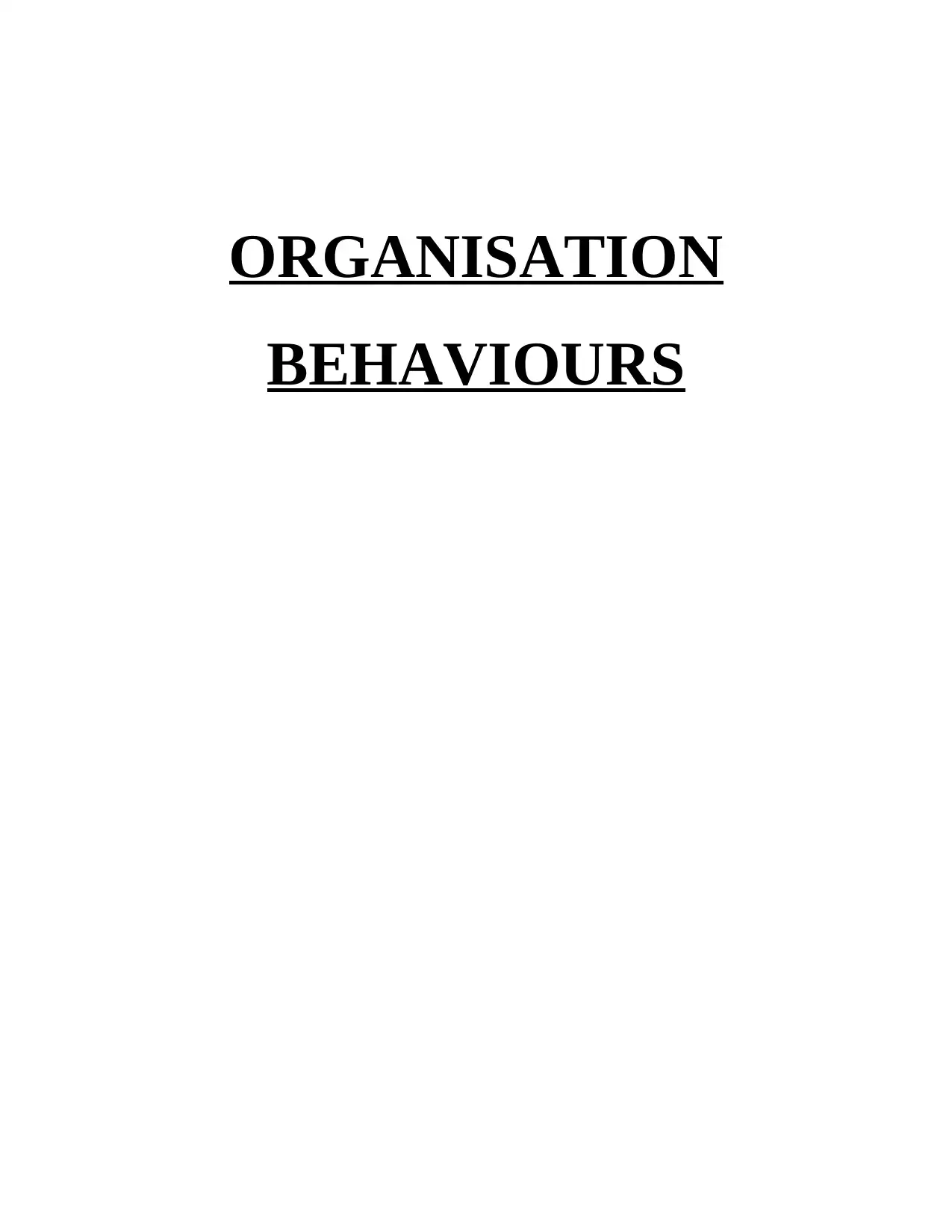
ORGANISATION
BEHAVIOURS
BEHAVIOURS
Secure Best Marks with AI Grader
Need help grading? Try our AI Grader for instant feedback on your assignments.
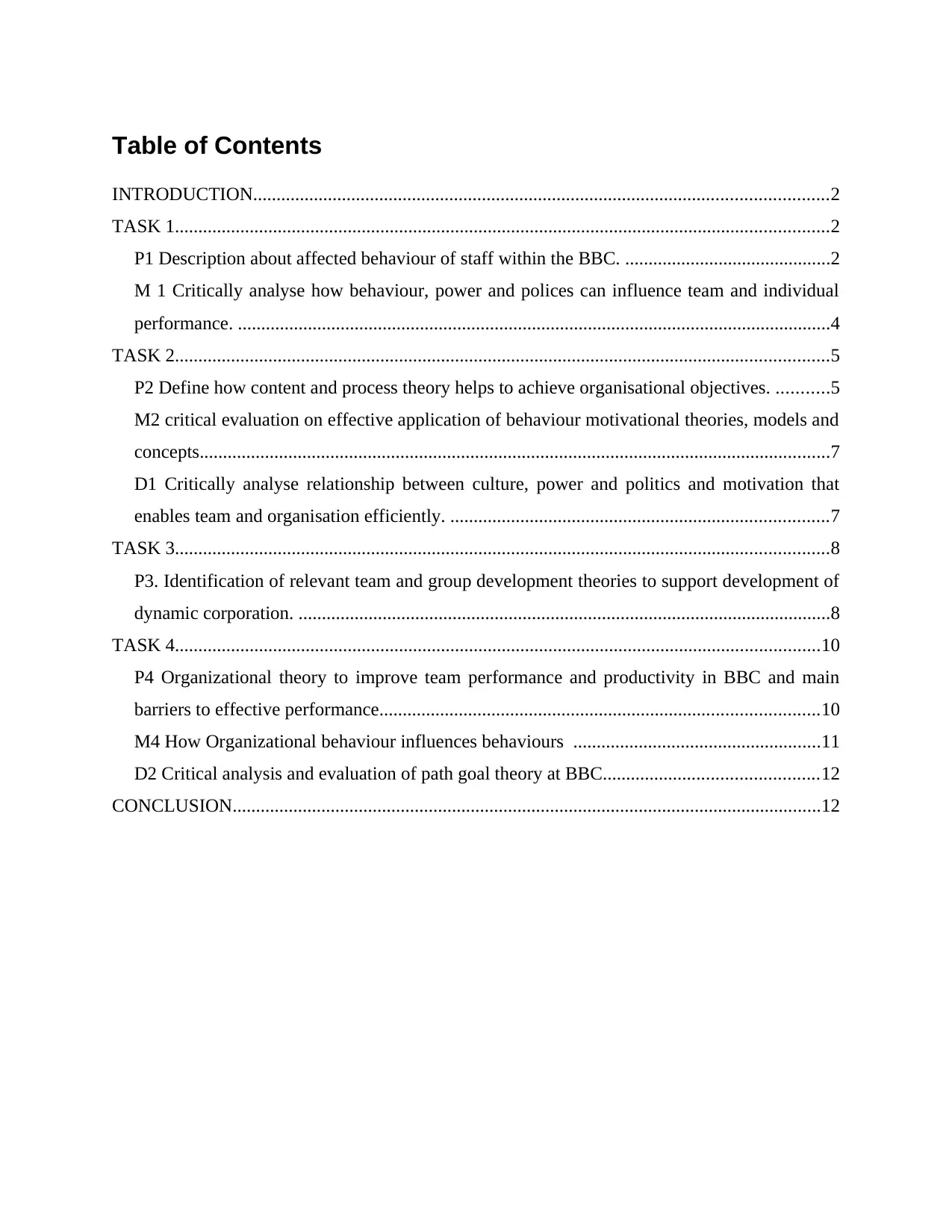
Table of Contents
INTRODUCTION...........................................................................................................................2
TASK 1............................................................................................................................................2
P1 Description about affected behaviour of staff within the BBC. ............................................2
M 1 Critically analyse how behaviour, power and polices can influence team and individual
performance. ...............................................................................................................................4
TASK 2............................................................................................................................................5
P2 Define how content and process theory helps to achieve organisational objectives. ...........5
M2 critical evaluation on effective application of behaviour motivational theories, models and
concepts.......................................................................................................................................7
D1 Critically analyse relationship between culture, power and politics and motivation that
enables team and organisation efficiently. .................................................................................7
TASK 3............................................................................................................................................8
P3. Identification of relevant team and group development theories to support development of
dynamic corporation. ..................................................................................................................8
TASK 4..........................................................................................................................................10
P4 Organizational theory to improve team performance and productivity in BBC and main
barriers to effective performance..............................................................................................10
M4 How Organizational behaviour influences behaviours .....................................................11
D2 Critical analysis and evaluation of path goal theory at BBC..............................................12
CONCLUSION..............................................................................................................................12
INTRODUCTION...........................................................................................................................2
TASK 1............................................................................................................................................2
P1 Description about affected behaviour of staff within the BBC. ............................................2
M 1 Critically analyse how behaviour, power and polices can influence team and individual
performance. ...............................................................................................................................4
TASK 2............................................................................................................................................5
P2 Define how content and process theory helps to achieve organisational objectives. ...........5
M2 critical evaluation on effective application of behaviour motivational theories, models and
concepts.......................................................................................................................................7
D1 Critically analyse relationship between culture, power and politics and motivation that
enables team and organisation efficiently. .................................................................................7
TASK 3............................................................................................................................................8
P3. Identification of relevant team and group development theories to support development of
dynamic corporation. ..................................................................................................................8
TASK 4..........................................................................................................................................10
P4 Organizational theory to improve team performance and productivity in BBC and main
barriers to effective performance..............................................................................................10
M4 How Organizational behaviour influences behaviours .....................................................11
D2 Critical analysis and evaluation of path goal theory at BBC..............................................12
CONCLUSION..............................................................................................................................12
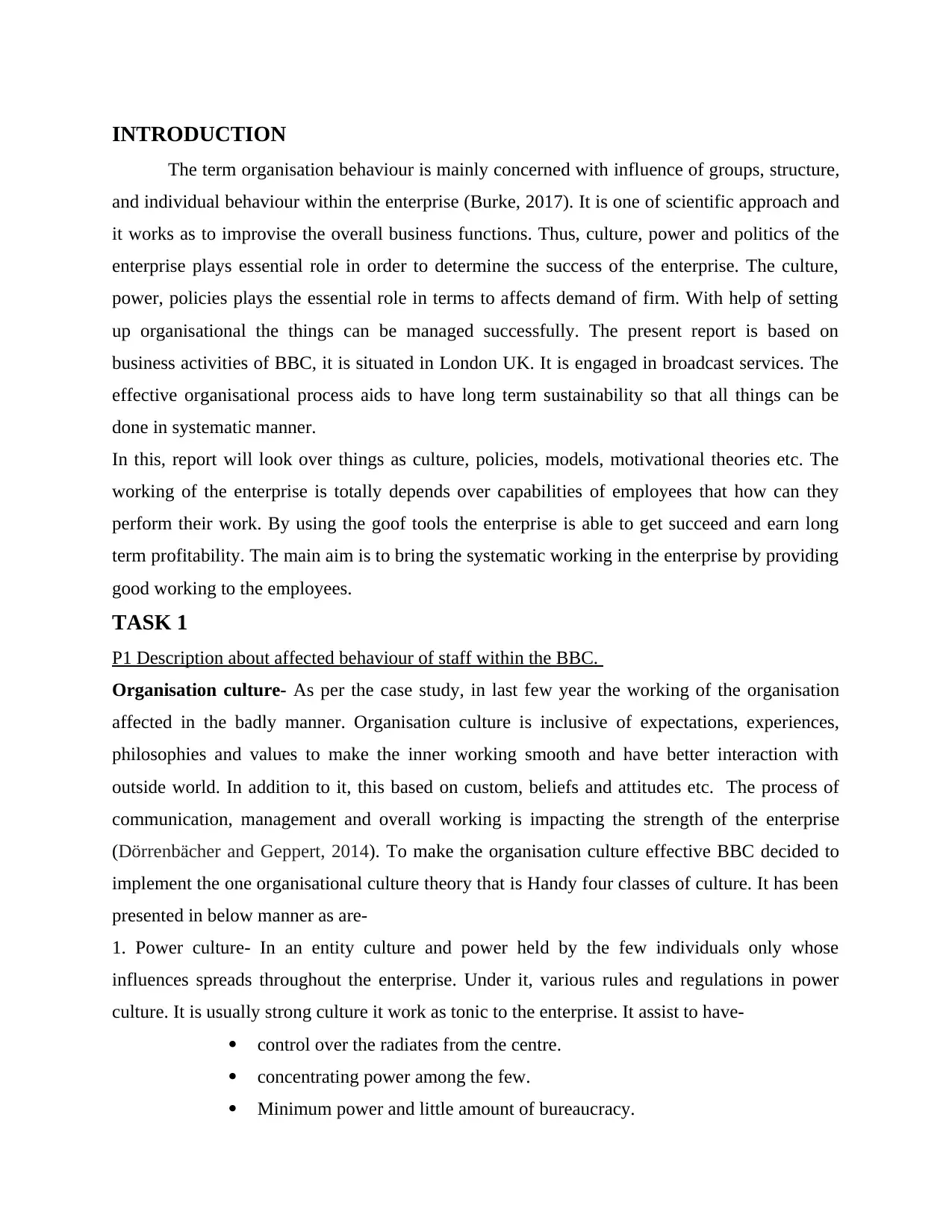
INTRODUCTION
The term organisation behaviour is mainly concerned with influence of groups, structure,
and individual behaviour within the enterprise (Burke, 2017). It is one of scientific approach and
it works as to improvise the overall business functions. Thus, culture, power and politics of the
enterprise plays essential role in order to determine the success of the enterprise. The culture,
power, policies plays the essential role in terms to affects demand of firm. With help of setting
up organisational the things can be managed successfully. The present report is based on
business activities of BBC, it is situated in London UK. It is engaged in broadcast services. The
effective organisational process aids to have long term sustainability so that all things can be
done in systematic manner.
In this, report will look over things as culture, policies, models, motivational theories etc. The
working of the enterprise is totally depends over capabilities of employees that how can they
perform their work. By using the goof tools the enterprise is able to get succeed and earn long
term profitability. The main aim is to bring the systematic working in the enterprise by providing
good working to the employees.
TASK 1
P1 Description about affected behaviour of staff within the BBC.
Organisation culture- As per the case study, in last few year the working of the organisation
affected in the badly manner. Organisation culture is inclusive of expectations, experiences,
philosophies and values to make the inner working smooth and have better interaction with
outside world. In addition to it, this based on custom, beliefs and attitudes etc. The process of
communication, management and overall working is impacting the strength of the enterprise
(Dörrenbächer and Geppert, 2014). To make the organisation culture effective BBC decided to
implement the one organisational culture theory that is Handy four classes of culture. It has been
presented in below manner as are-
1. Power culture- In an entity culture and power held by the few individuals only whose
influences spreads throughout the enterprise. Under it, various rules and regulations in power
culture. It is usually strong culture it work as tonic to the enterprise. It assist to have-
control over the radiates from the centre.
concentrating power among the few.
Minimum power and little amount of bureaucracy.
The term organisation behaviour is mainly concerned with influence of groups, structure,
and individual behaviour within the enterprise (Burke, 2017). It is one of scientific approach and
it works as to improvise the overall business functions. Thus, culture, power and politics of the
enterprise plays essential role in order to determine the success of the enterprise. The culture,
power, policies plays the essential role in terms to affects demand of firm. With help of setting
up organisational the things can be managed successfully. The present report is based on
business activities of BBC, it is situated in London UK. It is engaged in broadcast services. The
effective organisational process aids to have long term sustainability so that all things can be
done in systematic manner.
In this, report will look over things as culture, policies, models, motivational theories etc. The
working of the enterprise is totally depends over capabilities of employees that how can they
perform their work. By using the goof tools the enterprise is able to get succeed and earn long
term profitability. The main aim is to bring the systematic working in the enterprise by providing
good working to the employees.
TASK 1
P1 Description about affected behaviour of staff within the BBC.
Organisation culture- As per the case study, in last few year the working of the organisation
affected in the badly manner. Organisation culture is inclusive of expectations, experiences,
philosophies and values to make the inner working smooth and have better interaction with
outside world. In addition to it, this based on custom, beliefs and attitudes etc. The process of
communication, management and overall working is impacting the strength of the enterprise
(Dörrenbächer and Geppert, 2014). To make the organisation culture effective BBC decided to
implement the one organisational culture theory that is Handy four classes of culture. It has been
presented in below manner as are-
1. Power culture- In an entity culture and power held by the few individuals only whose
influences spreads throughout the enterprise. Under it, various rules and regulations in power
culture. It is usually strong culture it work as tonic to the enterprise. It assist to have-
control over the radiates from the centre.
concentrating power among the few.
Minimum power and little amount of bureaucracy.
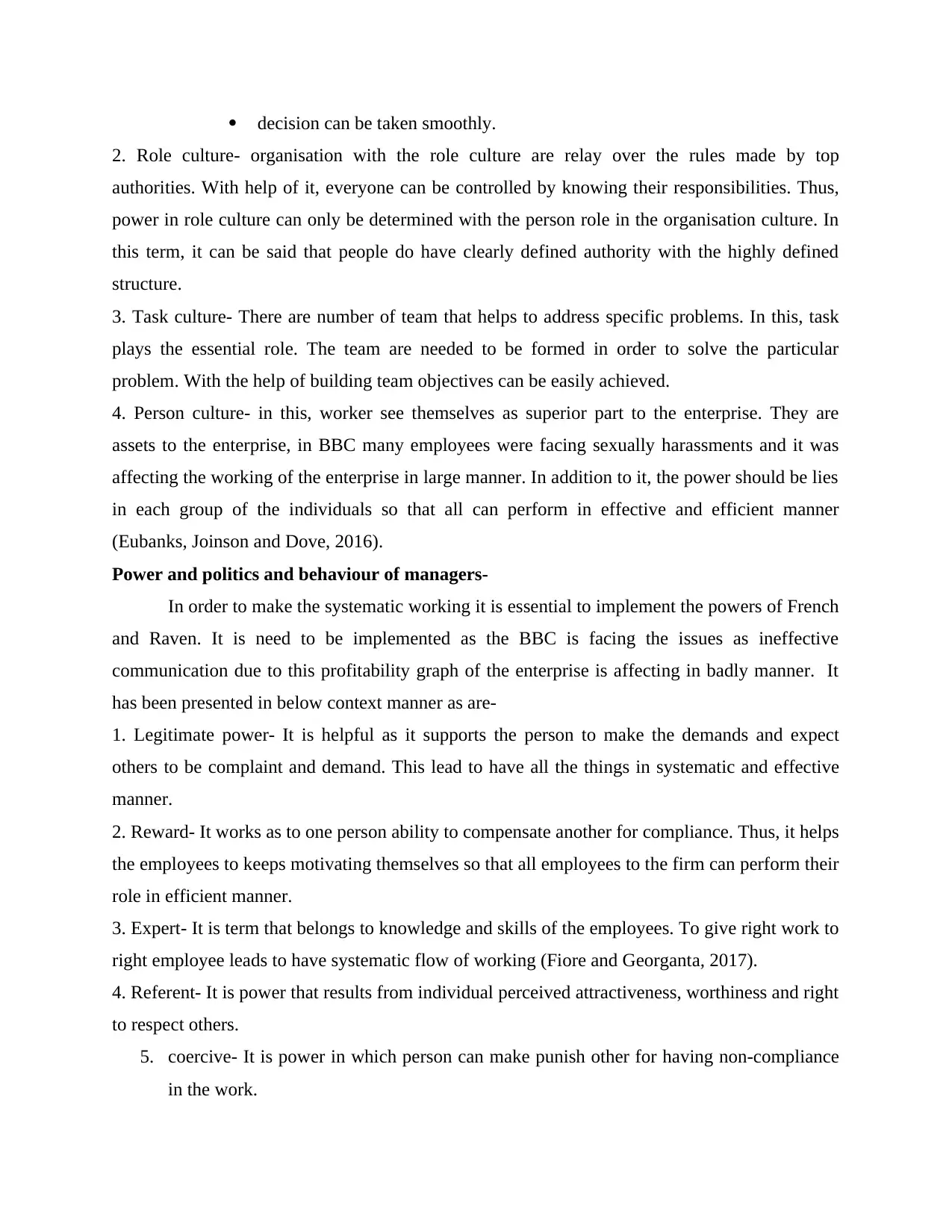
decision can be taken smoothly.
2. Role culture- organisation with the role culture are relay over the rules made by top
authorities. With help of it, everyone can be controlled by knowing their responsibilities. Thus,
power in role culture can only be determined with the person role in the organisation culture. In
this term, it can be said that people do have clearly defined authority with the highly defined
structure.
3. Task culture- There are number of team that helps to address specific problems. In this, task
plays the essential role. The team are needed to be formed in order to solve the particular
problem. With the help of building team objectives can be easily achieved.
4. Person culture- in this, worker see themselves as superior part to the enterprise. They are
assets to the enterprise, in BBC many employees were facing sexually harassments and it was
affecting the working of the enterprise in large manner. In addition to it, the power should be lies
in each group of the individuals so that all can perform in effective and efficient manner
(Eubanks, Joinson and Dove, 2016).
Power and politics and behaviour of managers-
In order to make the systematic working it is essential to implement the powers of French
and Raven. It is need to be implemented as the BBC is facing the issues as ineffective
communication due to this profitability graph of the enterprise is affecting in badly manner. It
has been presented in below context manner as are-
1. Legitimate power- It is helpful as it supports the person to make the demands and expect
others to be complaint and demand. This lead to have all the things in systematic and effective
manner.
2. Reward- It works as to one person ability to compensate another for compliance. Thus, it helps
the employees to keeps motivating themselves so that all employees to the firm can perform their
role in efficient manner.
3. Expert- It is term that belongs to knowledge and skills of the employees. To give right work to
right employee leads to have systematic flow of working (Fiore and Georganta, 2017).
4. Referent- It is power that results from individual perceived attractiveness, worthiness and right
to respect others.
5. coercive- It is power in which person can make punish other for having non-compliance
in the work.
2. Role culture- organisation with the role culture are relay over the rules made by top
authorities. With help of it, everyone can be controlled by knowing their responsibilities. Thus,
power in role culture can only be determined with the person role in the organisation culture. In
this term, it can be said that people do have clearly defined authority with the highly defined
structure.
3. Task culture- There are number of team that helps to address specific problems. In this, task
plays the essential role. The team are needed to be formed in order to solve the particular
problem. With the help of building team objectives can be easily achieved.
4. Person culture- in this, worker see themselves as superior part to the enterprise. They are
assets to the enterprise, in BBC many employees were facing sexually harassments and it was
affecting the working of the enterprise in large manner. In addition to it, the power should be lies
in each group of the individuals so that all can perform in effective and efficient manner
(Eubanks, Joinson and Dove, 2016).
Power and politics and behaviour of managers-
In order to make the systematic working it is essential to implement the powers of French
and Raven. It is need to be implemented as the BBC is facing the issues as ineffective
communication due to this profitability graph of the enterprise is affecting in badly manner. It
has been presented in below context manner as are-
1. Legitimate power- It is helpful as it supports the person to make the demands and expect
others to be complaint and demand. This lead to have all the things in systematic and effective
manner.
2. Reward- It works as to one person ability to compensate another for compliance. Thus, it helps
the employees to keeps motivating themselves so that all employees to the firm can perform their
role in efficient manner.
3. Expert- It is term that belongs to knowledge and skills of the employees. To give right work to
right employee leads to have systematic flow of working (Fiore and Georganta, 2017).
4. Referent- It is power that results from individual perceived attractiveness, worthiness and right
to respect others.
5. coercive- It is power in which person can make punish other for having non-compliance
in the work.
Secure Best Marks with AI Grader
Need help grading? Try our AI Grader for instant feedback on your assignments.
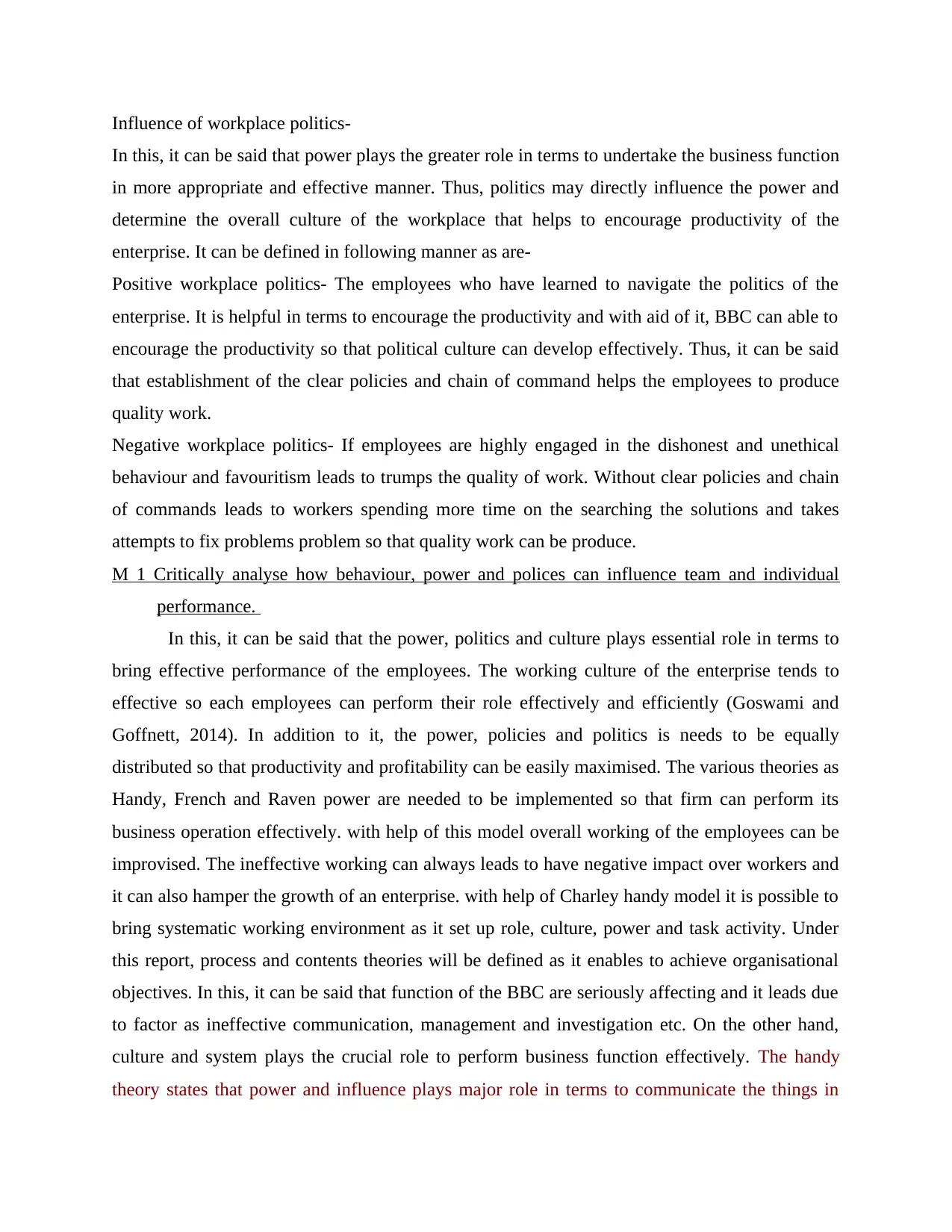
Influence of workplace politics-
In this, it can be said that power plays the greater role in terms to undertake the business function
in more appropriate and effective manner. Thus, politics may directly influence the power and
determine the overall culture of the workplace that helps to encourage productivity of the
enterprise. It can be defined in following manner as are-
Positive workplace politics- The employees who have learned to navigate the politics of the
enterprise. It is helpful in terms to encourage the productivity and with aid of it, BBC can able to
encourage the productivity so that political culture can develop effectively. Thus, it can be said
that establishment of the clear policies and chain of command helps the employees to produce
quality work.
Negative workplace politics- If employees are highly engaged in the dishonest and unethical
behaviour and favouritism leads to trumps the quality of work. Without clear policies and chain
of commands leads to workers spending more time on the searching the solutions and takes
attempts to fix problems problem so that quality work can be produce.
M 1 Critically analyse how behaviour, power and polices can influence team and individual
performance.
In this, it can be said that the power, politics and culture plays essential role in terms to
bring effective performance of the employees. The working culture of the enterprise tends to
effective so each employees can perform their role effectively and efficiently (Goswami and
Goffnett, 2014). In addition to it, the power, policies and politics is needs to be equally
distributed so that productivity and profitability can be easily maximised. The various theories as
Handy, French and Raven power are needed to be implemented so that firm can perform its
business operation effectively. with help of this model overall working of the employees can be
improvised. The ineffective working can always leads to have negative impact over workers and
it can also hamper the growth of an enterprise. with help of Charley handy model it is possible to
bring systematic working environment as it set up role, culture, power and task activity. Under
this report, process and contents theories will be defined as it enables to achieve organisational
objectives. In this, it can be said that function of the BBC are seriously affecting and it leads due
to factor as ineffective communication, management and investigation etc. On the other hand,
culture and system plays the crucial role to perform business function effectively. The handy
theory states that power and influence plays major role in terms to communicate the things in
In this, it can be said that power plays the greater role in terms to undertake the business function
in more appropriate and effective manner. Thus, politics may directly influence the power and
determine the overall culture of the workplace that helps to encourage productivity of the
enterprise. It can be defined in following manner as are-
Positive workplace politics- The employees who have learned to navigate the politics of the
enterprise. It is helpful in terms to encourage the productivity and with aid of it, BBC can able to
encourage the productivity so that political culture can develop effectively. Thus, it can be said
that establishment of the clear policies and chain of command helps the employees to produce
quality work.
Negative workplace politics- If employees are highly engaged in the dishonest and unethical
behaviour and favouritism leads to trumps the quality of work. Without clear policies and chain
of commands leads to workers spending more time on the searching the solutions and takes
attempts to fix problems problem so that quality work can be produce.
M 1 Critically analyse how behaviour, power and polices can influence team and individual
performance.
In this, it can be said that the power, politics and culture plays essential role in terms to
bring effective performance of the employees. The working culture of the enterprise tends to
effective so each employees can perform their role effectively and efficiently (Goswami and
Goffnett, 2014). In addition to it, the power, policies and politics is needs to be equally
distributed so that productivity and profitability can be easily maximised. The various theories as
Handy, French and Raven power are needed to be implemented so that firm can perform its
business operation effectively. with help of this model overall working of the employees can be
improvised. The ineffective working can always leads to have negative impact over workers and
it can also hamper the growth of an enterprise. with help of Charley handy model it is possible to
bring systematic working environment as it set up role, culture, power and task activity. Under
this report, process and contents theories will be defined as it enables to achieve organisational
objectives. In this, it can be said that function of the BBC are seriously affecting and it leads due
to factor as ineffective communication, management and investigation etc. On the other hand,
culture and system plays the crucial role to perform business function effectively. The handy
theory states that power and influence plays major role in terms to communicate the things in
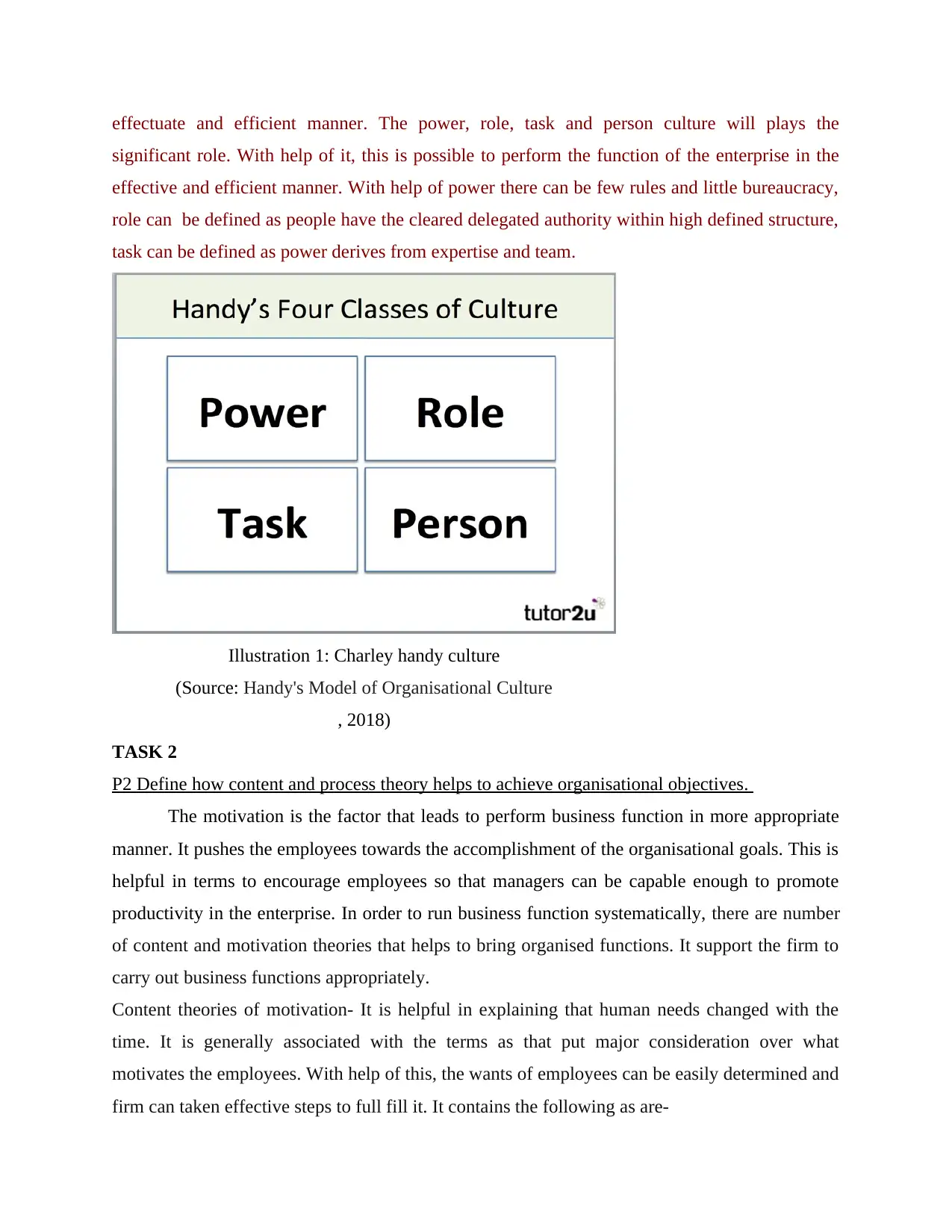
effectuate and efficient manner. The power, role, task and person culture will plays the
significant role. With help of it, this is possible to perform the function of the enterprise in the
effective and efficient manner. With help of power there can be few rules and little bureaucracy,
role can be defined as people have the cleared delegated authority within high defined structure,
task can be defined as power derives from expertise and team.
Illustration 1: Charley handy culture
(Source: Handy's Model of Organisational Culture
, 2018)
TASK 2
P2 Define how content and process theory helps to achieve organisational objectives.
The motivation is the factor that leads to perform business function in more appropriate
manner. It pushes the employees towards the accomplishment of the organisational goals. This is
helpful in terms to encourage employees so that managers can be capable enough to promote
productivity in the enterprise. In order to run business function systematically, there are number
of content and motivation theories that helps to bring organised functions. It support the firm to
carry out business functions appropriately.
Content theories of motivation- It is helpful in explaining that human needs changed with the
time. It is generally associated with the terms as that put major consideration over what
motivates the employees. With help of this, the wants of employees can be easily determined and
firm can taken effective steps to full fill it. It contains the following as are-
significant role. With help of it, this is possible to perform the function of the enterprise in the
effective and efficient manner. With help of power there can be few rules and little bureaucracy,
role can be defined as people have the cleared delegated authority within high defined structure,
task can be defined as power derives from expertise and team.
Illustration 1: Charley handy culture
(Source: Handy's Model of Organisational Culture
, 2018)
TASK 2
P2 Define how content and process theory helps to achieve organisational objectives.
The motivation is the factor that leads to perform business function in more appropriate
manner. It pushes the employees towards the accomplishment of the organisational goals. This is
helpful in terms to encourage employees so that managers can be capable enough to promote
productivity in the enterprise. In order to run business function systematically, there are number
of content and motivation theories that helps to bring organised functions. It support the firm to
carry out business functions appropriately.
Content theories of motivation- It is helpful in explaining that human needs changed with the
time. It is generally associated with the terms as that put major consideration over what
motivates the employees. With help of this, the wants of employees can be easily determined and
firm can taken effective steps to full fill it. It contains the following as are-
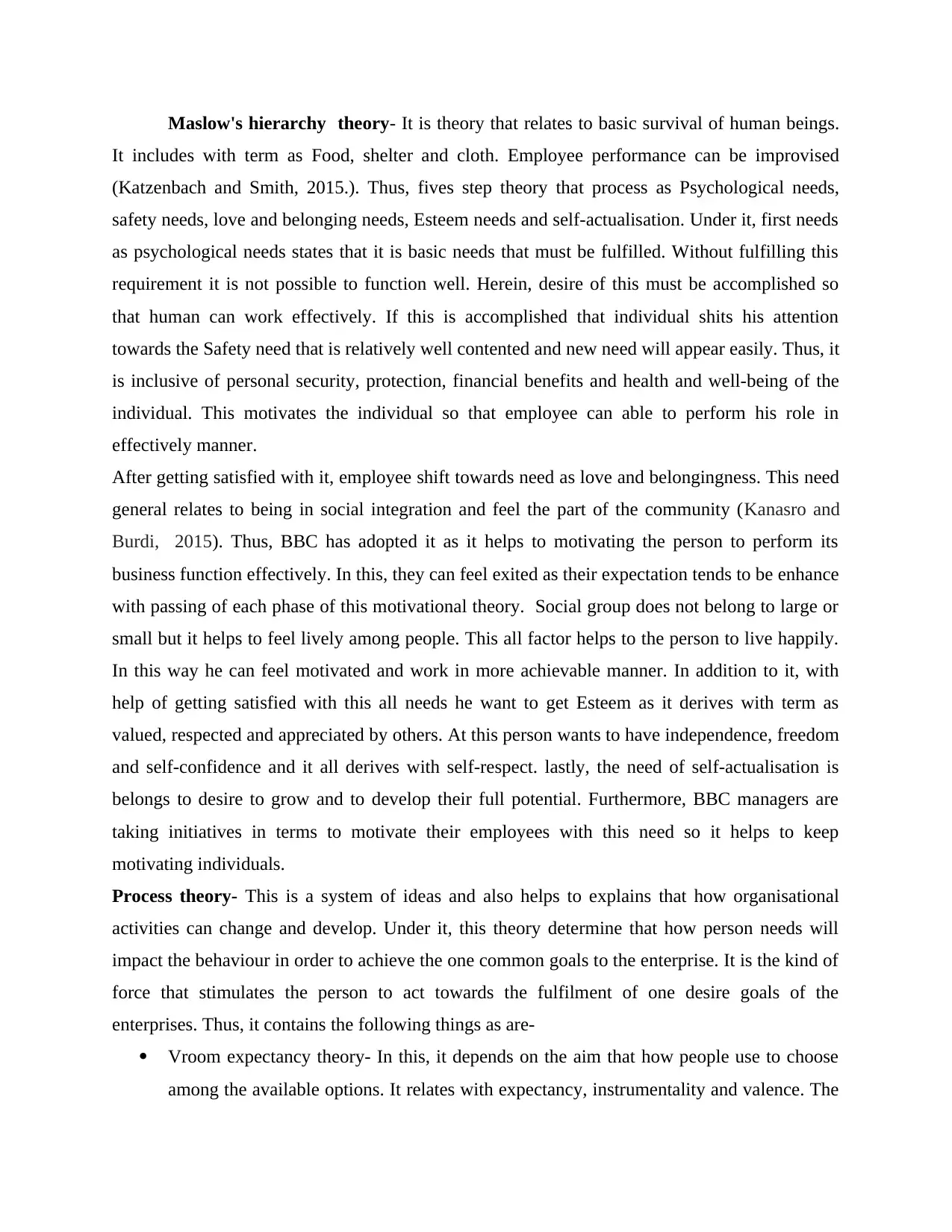
Maslow's hierarchy theory- It is theory that relates to basic survival of human beings.
It includes with term as Food, shelter and cloth. Employee performance can be improvised
(Katzenbach and Smith, 2015.). Thus, fives step theory that process as Psychological needs,
safety needs, love and belonging needs, Esteem needs and self-actualisation. Under it, first needs
as psychological needs states that it is basic needs that must be fulfilled. Without fulfilling this
requirement it is not possible to function well. Herein, desire of this must be accomplished so
that human can work effectively. If this is accomplished that individual shits his attention
towards the Safety need that is relatively well contented and new need will appear easily. Thus, it
is inclusive of personal security, protection, financial benefits and health and well-being of the
individual. This motivates the individual so that employee can able to perform his role in
effectively manner.
After getting satisfied with it, employee shift towards need as love and belongingness. This need
general relates to being in social integration and feel the part of the community (Kanasro and
Burdi, 2015). Thus, BBC has adopted it as it helps to motivating the person to perform its
business function effectively. In this, they can feel exited as their expectation tends to be enhance
with passing of each phase of this motivational theory. Social group does not belong to large or
small but it helps to feel lively among people. This all factor helps to the person to live happily.
In this way he can feel motivated and work in more achievable manner. In addition to it, with
help of getting satisfied with this all needs he want to get Esteem as it derives with term as
valued, respected and appreciated by others. At this person wants to have independence, freedom
and self-confidence and it all derives with self-respect. lastly, the need of self-actualisation is
belongs to desire to grow and to develop their full potential. Furthermore, BBC managers are
taking initiatives in terms to motivate their employees with this need so it helps to keep
motivating individuals.
Process theory- This is a system of ideas and also helps to explains that how organisational
activities can change and develop. Under it, this theory determine that how person needs will
impact the behaviour in order to achieve the one common goals to the enterprise. It is the kind of
force that stimulates the person to act towards the fulfilment of one desire goals of the
enterprises. Thus, it contains the following things as are-
Vroom expectancy theory- In this, it depends on the aim that how people use to choose
among the available options. It relates with expectancy, instrumentality and valence. The
It includes with term as Food, shelter and cloth. Employee performance can be improvised
(Katzenbach and Smith, 2015.). Thus, fives step theory that process as Psychological needs,
safety needs, love and belonging needs, Esteem needs and self-actualisation. Under it, first needs
as psychological needs states that it is basic needs that must be fulfilled. Without fulfilling this
requirement it is not possible to function well. Herein, desire of this must be accomplished so
that human can work effectively. If this is accomplished that individual shits his attention
towards the Safety need that is relatively well contented and new need will appear easily. Thus, it
is inclusive of personal security, protection, financial benefits and health and well-being of the
individual. This motivates the individual so that employee can able to perform his role in
effectively manner.
After getting satisfied with it, employee shift towards need as love and belongingness. This need
general relates to being in social integration and feel the part of the community (Kanasro and
Burdi, 2015). Thus, BBC has adopted it as it helps to motivating the person to perform its
business function effectively. In this, they can feel exited as their expectation tends to be enhance
with passing of each phase of this motivational theory. Social group does not belong to large or
small but it helps to feel lively among people. This all factor helps to the person to live happily.
In this way he can feel motivated and work in more achievable manner. In addition to it, with
help of getting satisfied with this all needs he want to get Esteem as it derives with term as
valued, respected and appreciated by others. At this person wants to have independence, freedom
and self-confidence and it all derives with self-respect. lastly, the need of self-actualisation is
belongs to desire to grow and to develop their full potential. Furthermore, BBC managers are
taking initiatives in terms to motivate their employees with this need so it helps to keep
motivating individuals.
Process theory- This is a system of ideas and also helps to explains that how organisational
activities can change and develop. Under it, this theory determine that how person needs will
impact the behaviour in order to achieve the one common goals to the enterprise. It is the kind of
force that stimulates the person to act towards the fulfilment of one desire goals of the
enterprises. Thus, it contains the following things as are-
Vroom expectancy theory- In this, it depends on the aim that how people use to choose
among the available options. It relates with expectancy, instrumentality and valence. The
Paraphrase This Document
Need a fresh take? Get an instant paraphrase of this document with our AI Paraphraser
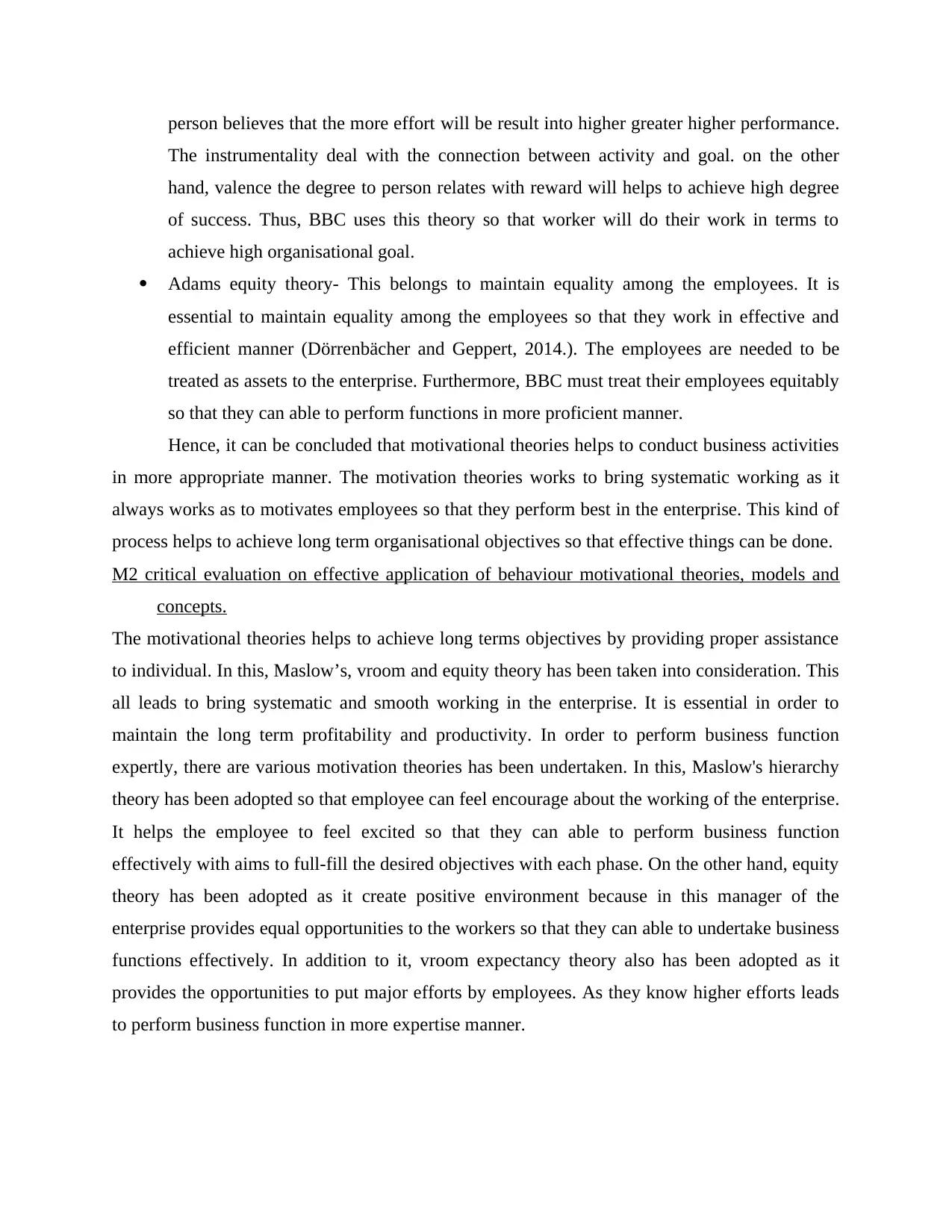
person believes that the more effort will be result into higher greater higher performance.
The instrumentality deal with the connection between activity and goal. on the other
hand, valence the degree to person relates with reward will helps to achieve high degree
of success. Thus, BBC uses this theory so that worker will do their work in terms to
achieve high organisational goal.
Adams equity theory- This belongs to maintain equality among the employees. It is
essential to maintain equality among the employees so that they work in effective and
efficient manner (Dörrenbächer and Geppert, 2014.). The employees are needed to be
treated as assets to the enterprise. Furthermore, BBC must treat their employees equitably
so that they can able to perform functions in more proficient manner.
Hence, it can be concluded that motivational theories helps to conduct business activities
in more appropriate manner. The motivation theories works to bring systematic working as it
always works as to motivates employees so that they perform best in the enterprise. This kind of
process helps to achieve long term organisational objectives so that effective things can be done.
M2 critical evaluation on effective application of behaviour motivational theories, models and
concepts.
The motivational theories helps to achieve long terms objectives by providing proper assistance
to individual. In this, Maslow’s, vroom and equity theory has been taken into consideration. This
all leads to bring systematic and smooth working in the enterprise. It is essential in order to
maintain the long term profitability and productivity. In order to perform business function
expertly, there are various motivation theories has been undertaken. In this, Maslow's hierarchy
theory has been adopted so that employee can feel encourage about the working of the enterprise.
It helps the employee to feel excited so that they can able to perform business function
effectively with aims to full-fill the desired objectives with each phase. On the other hand, equity
theory has been adopted as it create positive environment because in this manager of the
enterprise provides equal opportunities to the workers so that they can able to undertake business
functions effectively. In addition to it, vroom expectancy theory also has been adopted as it
provides the opportunities to put major efforts by employees. As they know higher efforts leads
to perform business function in more expertise manner.
The instrumentality deal with the connection between activity and goal. on the other
hand, valence the degree to person relates with reward will helps to achieve high degree
of success. Thus, BBC uses this theory so that worker will do their work in terms to
achieve high organisational goal.
Adams equity theory- This belongs to maintain equality among the employees. It is
essential to maintain equality among the employees so that they work in effective and
efficient manner (Dörrenbächer and Geppert, 2014.). The employees are needed to be
treated as assets to the enterprise. Furthermore, BBC must treat their employees equitably
so that they can able to perform functions in more proficient manner.
Hence, it can be concluded that motivational theories helps to conduct business activities
in more appropriate manner. The motivation theories works to bring systematic working as it
always works as to motivates employees so that they perform best in the enterprise. This kind of
process helps to achieve long term organisational objectives so that effective things can be done.
M2 critical evaluation on effective application of behaviour motivational theories, models and
concepts.
The motivational theories helps to achieve long terms objectives by providing proper assistance
to individual. In this, Maslow’s, vroom and equity theory has been taken into consideration. This
all leads to bring systematic and smooth working in the enterprise. It is essential in order to
maintain the long term profitability and productivity. In order to perform business function
expertly, there are various motivation theories has been undertaken. In this, Maslow's hierarchy
theory has been adopted so that employee can feel encourage about the working of the enterprise.
It helps the employee to feel excited so that they can able to perform business function
effectively with aims to full-fill the desired objectives with each phase. On the other hand, equity
theory has been adopted as it create positive environment because in this manager of the
enterprise provides equal opportunities to the workers so that they can able to undertake business
functions effectively. In addition to it, vroom expectancy theory also has been adopted as it
provides the opportunities to put major efforts by employees. As they know higher efforts leads
to perform business function in more expertise manner.
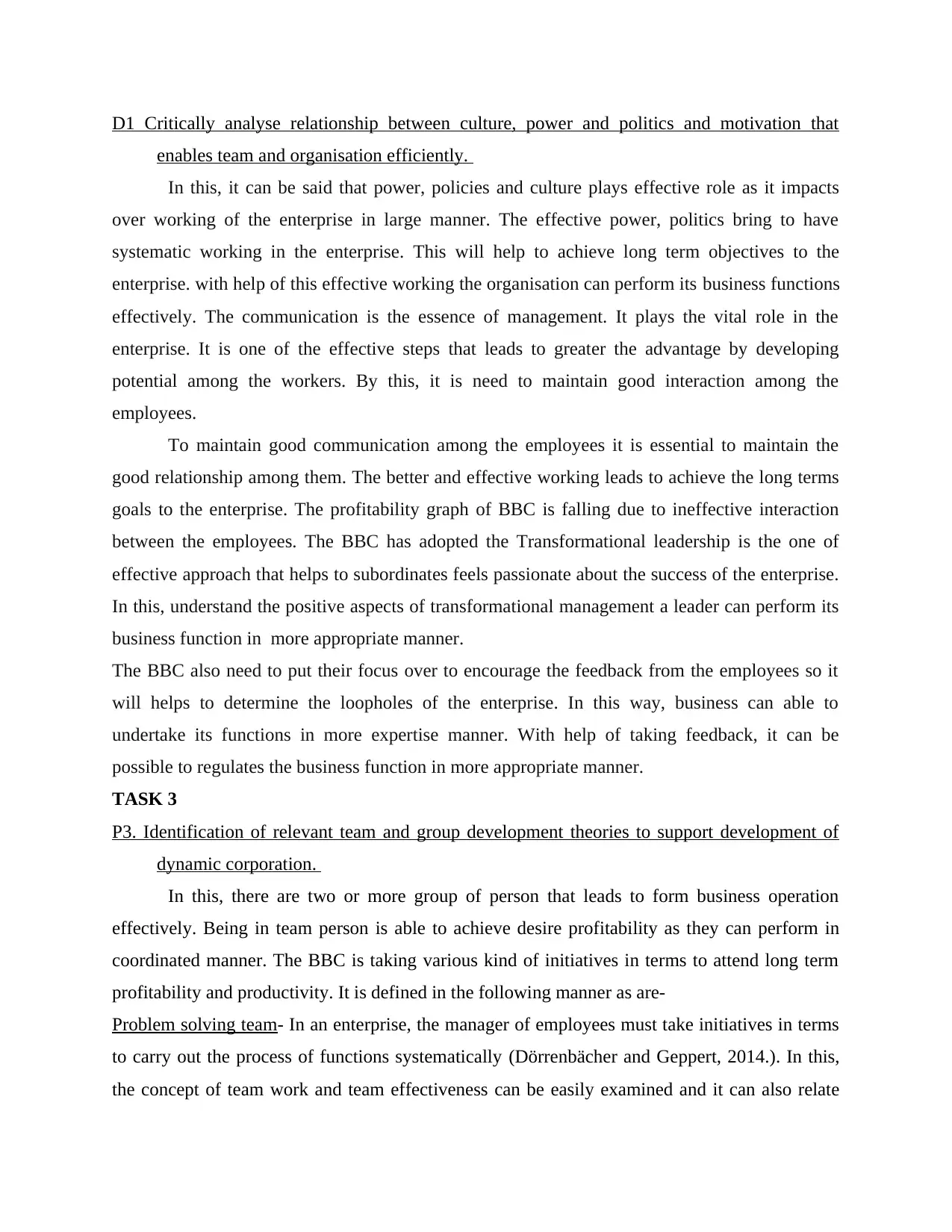
D1 Critically analyse relationship between culture, power and politics and motivation that
enables team and organisation efficiently.
In this, it can be said that power, policies and culture plays effective role as it impacts
over working of the enterprise in large manner. The effective power, politics bring to have
systematic working in the enterprise. This will help to achieve long term objectives to the
enterprise. with help of this effective working the organisation can perform its business functions
effectively. The communication is the essence of management. It plays the vital role in the
enterprise. It is one of the effective steps that leads to greater the advantage by developing
potential among the workers. By this, it is need to maintain good interaction among the
employees.
To maintain good communication among the employees it is essential to maintain the
good relationship among them. The better and effective working leads to achieve the long terms
goals to the enterprise. The profitability graph of BBC is falling due to ineffective interaction
between the employees. The BBC has adopted the Transformational leadership is the one of
effective approach that helps to subordinates feels passionate about the success of the enterprise.
In this, understand the positive aspects of transformational management a leader can perform its
business function in more appropriate manner.
The BBC also need to put their focus over to encourage the feedback from the employees so it
will helps to determine the loopholes of the enterprise. In this way, business can able to
undertake its functions in more expertise manner. With help of taking feedback, it can be
possible to regulates the business function in more appropriate manner.
TASK 3
P3. Identification of relevant team and group development theories to support development of
dynamic corporation.
In this, there are two or more group of person that leads to form business operation
effectively. Being in team person is able to achieve desire profitability as they can perform in
coordinated manner. The BBC is taking various kind of initiatives in terms to attend long term
profitability and productivity. It is defined in the following manner as are-
Problem solving team- In an enterprise, the manager of employees must take initiatives in terms
to carry out the process of functions systematically (Dörrenbächer and Geppert, 2014.). In this,
the concept of team work and team effectiveness can be easily examined and it can also relate
enables team and organisation efficiently.
In this, it can be said that power, policies and culture plays effective role as it impacts
over working of the enterprise in large manner. The effective power, politics bring to have
systematic working in the enterprise. This will help to achieve long term objectives to the
enterprise. with help of this effective working the organisation can perform its business functions
effectively. The communication is the essence of management. It plays the vital role in the
enterprise. It is one of the effective steps that leads to greater the advantage by developing
potential among the workers. By this, it is need to maintain good interaction among the
employees.
To maintain good communication among the employees it is essential to maintain the
good relationship among them. The better and effective working leads to achieve the long terms
goals to the enterprise. The profitability graph of BBC is falling due to ineffective interaction
between the employees. The BBC has adopted the Transformational leadership is the one of
effective approach that helps to subordinates feels passionate about the success of the enterprise.
In this, understand the positive aspects of transformational management a leader can perform its
business function in more appropriate manner.
The BBC also need to put their focus over to encourage the feedback from the employees so it
will helps to determine the loopholes of the enterprise. In this way, business can able to
undertake its functions in more expertise manner. With help of taking feedback, it can be
possible to regulates the business function in more appropriate manner.
TASK 3
P3. Identification of relevant team and group development theories to support development of
dynamic corporation.
In this, there are two or more group of person that leads to form business operation
effectively. Being in team person is able to achieve desire profitability as they can perform in
coordinated manner. The BBC is taking various kind of initiatives in terms to attend long term
profitability and productivity. It is defined in the following manner as are-
Problem solving team- In an enterprise, the manager of employees must take initiatives in terms
to carry out the process of functions systematically (Dörrenbächer and Geppert, 2014.). In this,
the concept of team work and team effectiveness can be easily examined and it can also relate
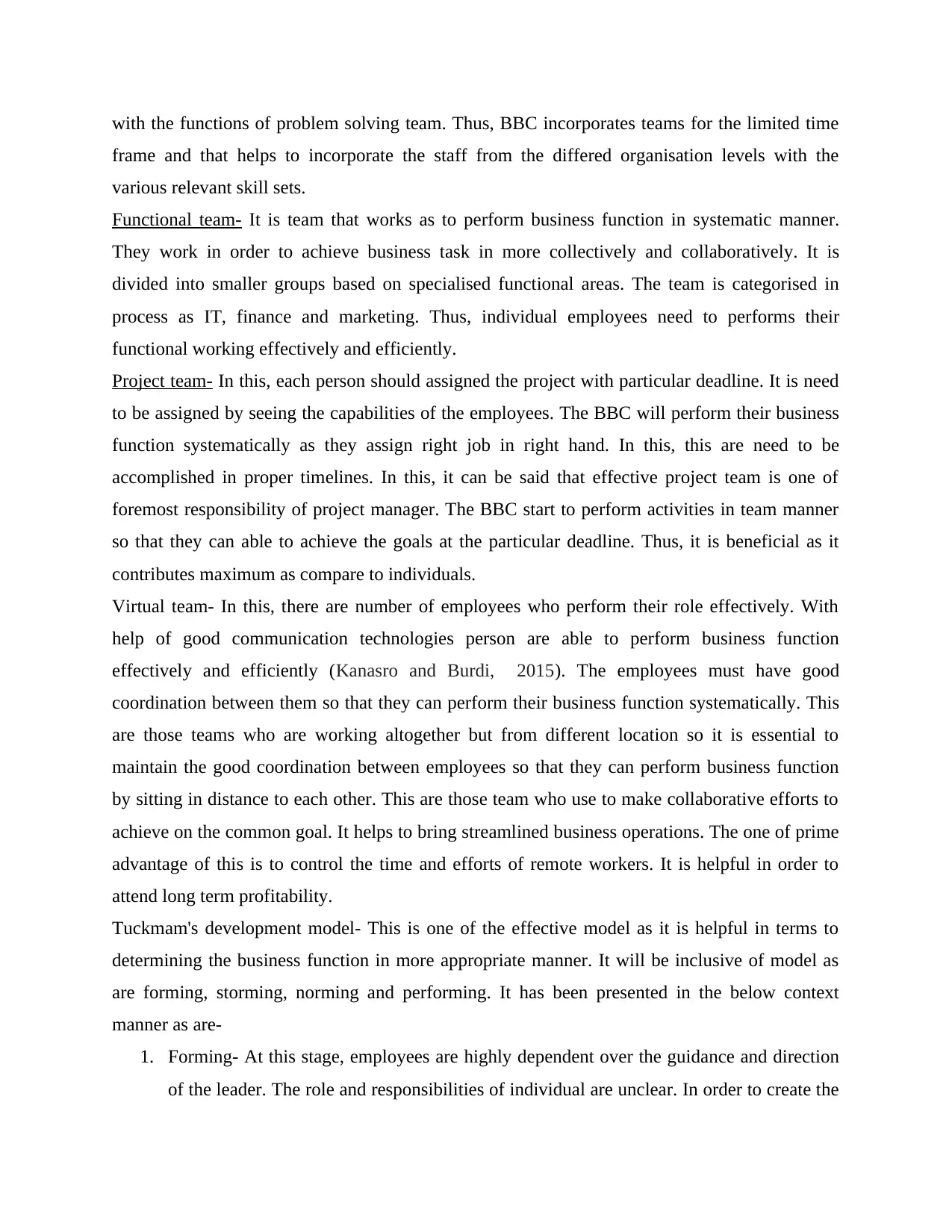
with the functions of problem solving team. Thus, BBC incorporates teams for the limited time
frame and that helps to incorporate the staff from the differed organisation levels with the
various relevant skill sets.
Functional team- It is team that works as to perform business function in systematic manner.
They work in order to achieve business task in more collectively and collaboratively. It is
divided into smaller groups based on specialised functional areas. The team is categorised in
process as IT, finance and marketing. Thus, individual employees need to performs their
functional working effectively and efficiently.
Project team- In this, each person should assigned the project with particular deadline. It is need
to be assigned by seeing the capabilities of the employees. The BBC will perform their business
function systematically as they assign right job in right hand. In this, this are need to be
accomplished in proper timelines. In this, it can be said that effective project team is one of
foremost responsibility of project manager. The BBC start to perform activities in team manner
so that they can able to achieve the goals at the particular deadline. Thus, it is beneficial as it
contributes maximum as compare to individuals.
Virtual team- In this, there are number of employees who perform their role effectively. With
help of good communication technologies person are able to perform business function
effectively and efficiently (Kanasro and Burdi, 2015). The employees must have good
coordination between them so that they can perform their business function systematically. This
are those teams who are working altogether but from different location so it is essential to
maintain the good coordination between employees so that they can perform business function
by sitting in distance to each other. This are those team who use to make collaborative efforts to
achieve on the common goal. It helps to bring streamlined business operations. The one of prime
advantage of this is to control the time and efforts of remote workers. It is helpful in order to
attend long term profitability.
Tuckmam's development model- This is one of the effective model as it is helpful in terms to
determining the business function in more appropriate manner. It will be inclusive of model as
are forming, storming, norming and performing. It has been presented in the below context
manner as are-
1. Forming- At this stage, employees are highly dependent over the guidance and direction
of the leader. The role and responsibilities of individual are unclear. In order to create the
frame and that helps to incorporate the staff from the differed organisation levels with the
various relevant skill sets.
Functional team- It is team that works as to perform business function in systematic manner.
They work in order to achieve business task in more collectively and collaboratively. It is
divided into smaller groups based on specialised functional areas. The team is categorised in
process as IT, finance and marketing. Thus, individual employees need to performs their
functional working effectively and efficiently.
Project team- In this, each person should assigned the project with particular deadline. It is need
to be assigned by seeing the capabilities of the employees. The BBC will perform their business
function systematically as they assign right job in right hand. In this, this are need to be
accomplished in proper timelines. In this, it can be said that effective project team is one of
foremost responsibility of project manager. The BBC start to perform activities in team manner
so that they can able to achieve the goals at the particular deadline. Thus, it is beneficial as it
contributes maximum as compare to individuals.
Virtual team- In this, there are number of employees who perform their role effectively. With
help of good communication technologies person are able to perform business function
effectively and efficiently (Kanasro and Burdi, 2015). The employees must have good
coordination between them so that they can perform their business function systematically. This
are those teams who are working altogether but from different location so it is essential to
maintain the good coordination between employees so that they can perform business function
by sitting in distance to each other. This are those team who use to make collaborative efforts to
achieve on the common goal. It helps to bring streamlined business operations. The one of prime
advantage of this is to control the time and efforts of remote workers. It is helpful in order to
attend long term profitability.
Tuckmam's development model- This is one of the effective model as it is helpful in terms to
determining the business function in more appropriate manner. It will be inclusive of model as
are forming, storming, norming and performing. It has been presented in the below context
manner as are-
1. Forming- At this stage, employees are highly dependent over the guidance and direction
of the leader. The role and responsibilities of individual are unclear. In order to create the
Secure Best Marks with AI Grader
Need help grading? Try our AI Grader for instant feedback on your assignments.
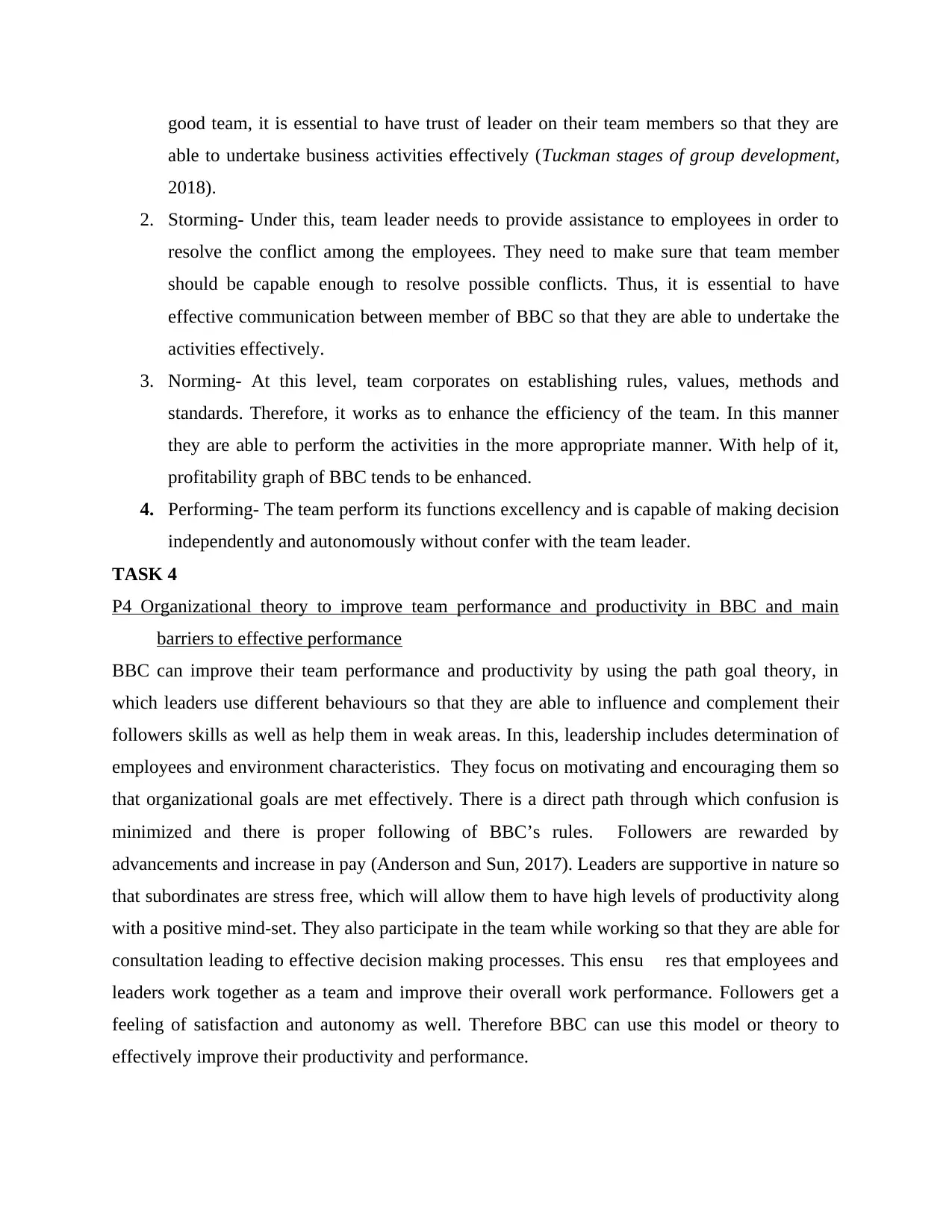
good team, it is essential to have trust of leader on their team members so that they are
able to undertake business activities effectively (Tuckman stages of group development,
2018).
2. Storming- Under this, team leader needs to provide assistance to employees in order to
resolve the conflict among the employees. They need to make sure that team member
should be capable enough to resolve possible conflicts. Thus, it is essential to have
effective communication between member of BBC so that they are able to undertake the
activities effectively.
3. Norming- At this level, team corporates on establishing rules, values, methods and
standards. Therefore, it works as to enhance the efficiency of the team. In this manner
they are able to perform the activities in the more appropriate manner. With help of it,
profitability graph of BBC tends to be enhanced.
4. Performing- The team perform its functions excellency and is capable of making decision
independently and autonomously without confer with the team leader.
TASK 4
P4 Organizational theory to improve team performance and productivity in BBC and main
barriers to effective performance
BBC can improve their team performance and productivity by using the path goal theory, in
which leaders use different behaviours so that they are able to influence and complement their
followers skills as well as help them in weak areas. In this, leadership includes determination of
employees and environment characteristics. They focus on motivating and encouraging them so
that organizational goals are met effectively. There is a direct path through which confusion is
minimized and there is proper following of BBC’s rules. Followers are rewarded by
advancements and increase in pay (Anderson and Sun, 2017). Leaders are supportive in nature so
that subordinates are stress free, which will allow them to have high levels of productivity along
with a positive mind-set. They also participate in the team while working so that they are able for
consultation leading to effective decision making processes. This ensu res that employees and
leaders work together as a team and improve their overall work performance. Followers get a
feeling of satisfaction and autonomy as well. Therefore BBC can use this model or theory to
effectively improve their productivity and performance.
able to undertake business activities effectively (Tuckman stages of group development,
2018).
2. Storming- Under this, team leader needs to provide assistance to employees in order to
resolve the conflict among the employees. They need to make sure that team member
should be capable enough to resolve possible conflicts. Thus, it is essential to have
effective communication between member of BBC so that they are able to undertake the
activities effectively.
3. Norming- At this level, team corporates on establishing rules, values, methods and
standards. Therefore, it works as to enhance the efficiency of the team. In this manner
they are able to perform the activities in the more appropriate manner. With help of it,
profitability graph of BBC tends to be enhanced.
4. Performing- The team perform its functions excellency and is capable of making decision
independently and autonomously without confer with the team leader.
TASK 4
P4 Organizational theory to improve team performance and productivity in BBC and main
barriers to effective performance
BBC can improve their team performance and productivity by using the path goal theory, in
which leaders use different behaviours so that they are able to influence and complement their
followers skills as well as help them in weak areas. In this, leadership includes determination of
employees and environment characteristics. They focus on motivating and encouraging them so
that organizational goals are met effectively. There is a direct path through which confusion is
minimized and there is proper following of BBC’s rules. Followers are rewarded by
advancements and increase in pay (Anderson and Sun, 2017). Leaders are supportive in nature so
that subordinates are stress free, which will allow them to have high levels of productivity along
with a positive mind-set. They also participate in the team while working so that they are able for
consultation leading to effective decision making processes. This ensu res that employees and
leaders work together as a team and improve their overall work performance. Followers get a
feeling of satisfaction and autonomy as well. Therefore BBC can use this model or theory to
effectively improve their productivity and performance.
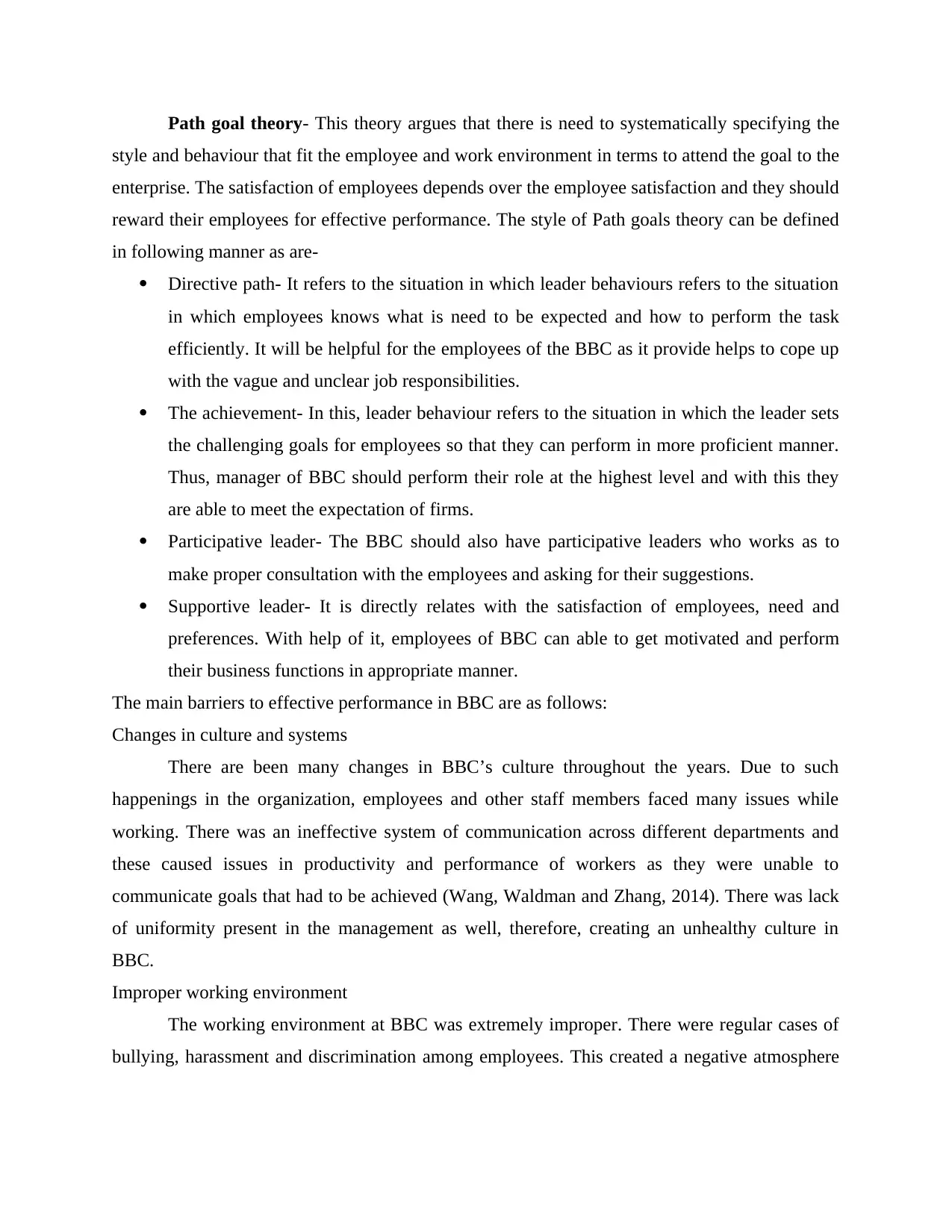
Path goal theory- This theory argues that there is need to systematically specifying the
style and behaviour that fit the employee and work environment in terms to attend the goal to the
enterprise. The satisfaction of employees depends over the employee satisfaction and they should
reward their employees for effective performance. The style of Path goals theory can be defined
in following manner as are-
Directive path- It refers to the situation in which leader behaviours refers to the situation
in which employees knows what is need to be expected and how to perform the task
efficiently. It will be helpful for the employees of the BBC as it provide helps to cope up
with the vague and unclear job responsibilities.
The achievement- In this, leader behaviour refers to the situation in which the leader sets
the challenging goals for employees so that they can perform in more proficient manner.
Thus, manager of BBC should perform their role at the highest level and with this they
are able to meet the expectation of firms.
Participative leader- The BBC should also have participative leaders who works as to
make proper consultation with the employees and asking for their suggestions.
Supportive leader- It is directly relates with the satisfaction of employees, need and
preferences. With help of it, employees of BBC can able to get motivated and perform
their business functions in appropriate manner.
The main barriers to effective performance in BBC are as follows:
Changes in culture and systems
There are been many changes in BBC’s culture throughout the years. Due to such
happenings in the organization, employees and other staff members faced many issues while
working. There was an ineffective system of communication across different departments and
these caused issues in productivity and performance of workers as they were unable to
communicate goals that had to be achieved (Wang, Waldman and Zhang, 2014). There was lack
of uniformity present in the management as well, therefore, creating an unhealthy culture in
BBC.
Improper working environment
The working environment at BBC was extremely improper. There were regular cases of
bullying, harassment and discrimination among employees. This created a negative atmosphere
style and behaviour that fit the employee and work environment in terms to attend the goal to the
enterprise. The satisfaction of employees depends over the employee satisfaction and they should
reward their employees for effective performance. The style of Path goals theory can be defined
in following manner as are-
Directive path- It refers to the situation in which leader behaviours refers to the situation
in which employees knows what is need to be expected and how to perform the task
efficiently. It will be helpful for the employees of the BBC as it provide helps to cope up
with the vague and unclear job responsibilities.
The achievement- In this, leader behaviour refers to the situation in which the leader sets
the challenging goals for employees so that they can perform in more proficient manner.
Thus, manager of BBC should perform their role at the highest level and with this they
are able to meet the expectation of firms.
Participative leader- The BBC should also have participative leaders who works as to
make proper consultation with the employees and asking for their suggestions.
Supportive leader- It is directly relates with the satisfaction of employees, need and
preferences. With help of it, employees of BBC can able to get motivated and perform
their business functions in appropriate manner.
The main barriers to effective performance in BBC are as follows:
Changes in culture and systems
There are been many changes in BBC’s culture throughout the years. Due to such
happenings in the organization, employees and other staff members faced many issues while
working. There was an ineffective system of communication across different departments and
these caused issues in productivity and performance of workers as they were unable to
communicate goals that had to be achieved (Wang, Waldman and Zhang, 2014). There was lack
of uniformity present in the management as well, therefore, creating an unhealthy culture in
BBC.
Improper working environment
The working environment at BBC was extremely improper. There were regular cases of
bullying, harassment and discrimination among employees. This created a negative atmosphere
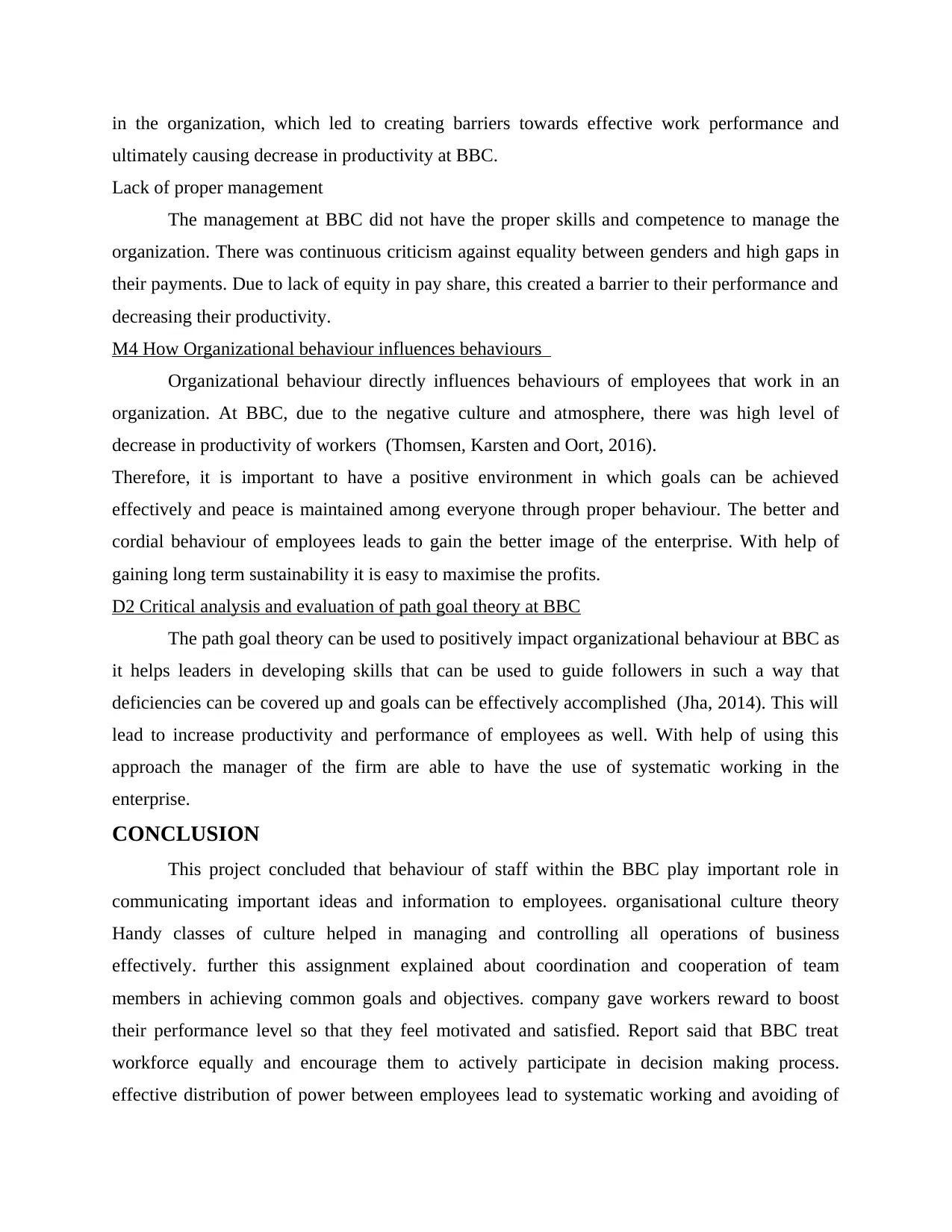
in the organization, which led to creating barriers towards effective work performance and
ultimately causing decrease in productivity at BBC.
Lack of proper management
The management at BBC did not have the proper skills and competence to manage the
organization. There was continuous criticism against equality between genders and high gaps in
their payments. Due to lack of equity in pay share, this created a barrier to their performance and
decreasing their productivity.
M4 How Organizational behaviour influences behaviours
Organizational behaviour directly influences behaviours of employees that work in an
organization. At BBC, due to the negative culture and atmosphere, there was high level of
decrease in productivity of workers (Thomsen, Karsten and Oort, 2016).
Therefore, it is important to have a positive environment in which goals can be achieved
effectively and peace is maintained among everyone through proper behaviour. The better and
cordial behaviour of employees leads to gain the better image of the enterprise. With help of
gaining long term sustainability it is easy to maximise the profits.
D2 Critical analysis and evaluation of path goal theory at BBC
The path goal theory can be used to positively impact organizational behaviour at BBC as
it helps leaders in developing skills that can be used to guide followers in such a way that
deficiencies can be covered up and goals can be effectively accomplished (Jha, 2014). This will
lead to increase productivity and performance of employees as well. With help of using this
approach the manager of the firm are able to have the use of systematic working in the
enterprise.
CONCLUSION
This project concluded that behaviour of staff within the BBC play important role in
communicating important ideas and information to employees. organisational culture theory
Handy classes of culture helped in managing and controlling all operations of business
effectively. further this assignment explained about coordination and cooperation of team
members in achieving common goals and objectives. company gave workers reward to boost
their performance level so that they feel motivated and satisfied. Report said that BBC treat
workforce equally and encourage them to actively participate in decision making process.
effective distribution of power between employees lead to systematic working and avoiding of
ultimately causing decrease in productivity at BBC.
Lack of proper management
The management at BBC did not have the proper skills and competence to manage the
organization. There was continuous criticism against equality between genders and high gaps in
their payments. Due to lack of equity in pay share, this created a barrier to their performance and
decreasing their productivity.
M4 How Organizational behaviour influences behaviours
Organizational behaviour directly influences behaviours of employees that work in an
organization. At BBC, due to the negative culture and atmosphere, there was high level of
decrease in productivity of workers (Thomsen, Karsten and Oort, 2016).
Therefore, it is important to have a positive environment in which goals can be achieved
effectively and peace is maintained among everyone through proper behaviour. The better and
cordial behaviour of employees leads to gain the better image of the enterprise. With help of
gaining long term sustainability it is easy to maximise the profits.
D2 Critical analysis and evaluation of path goal theory at BBC
The path goal theory can be used to positively impact organizational behaviour at BBC as
it helps leaders in developing skills that can be used to guide followers in such a way that
deficiencies can be covered up and goals can be effectively accomplished (Jha, 2014). This will
lead to increase productivity and performance of employees as well. With help of using this
approach the manager of the firm are able to have the use of systematic working in the
enterprise.
CONCLUSION
This project concluded that behaviour of staff within the BBC play important role in
communicating important ideas and information to employees. organisational culture theory
Handy classes of culture helped in managing and controlling all operations of business
effectively. further this assignment explained about coordination and cooperation of team
members in achieving common goals and objectives. company gave workers reward to boost
their performance level so that they feel motivated and satisfied. Report said that BBC treat
workforce equally and encourage them to actively participate in decision making process.
effective distribution of power between employees lead to systematic working and avoiding of
Paraphrase This Document
Need a fresh take? Get an instant paraphrase of this document with our AI Paraphraser
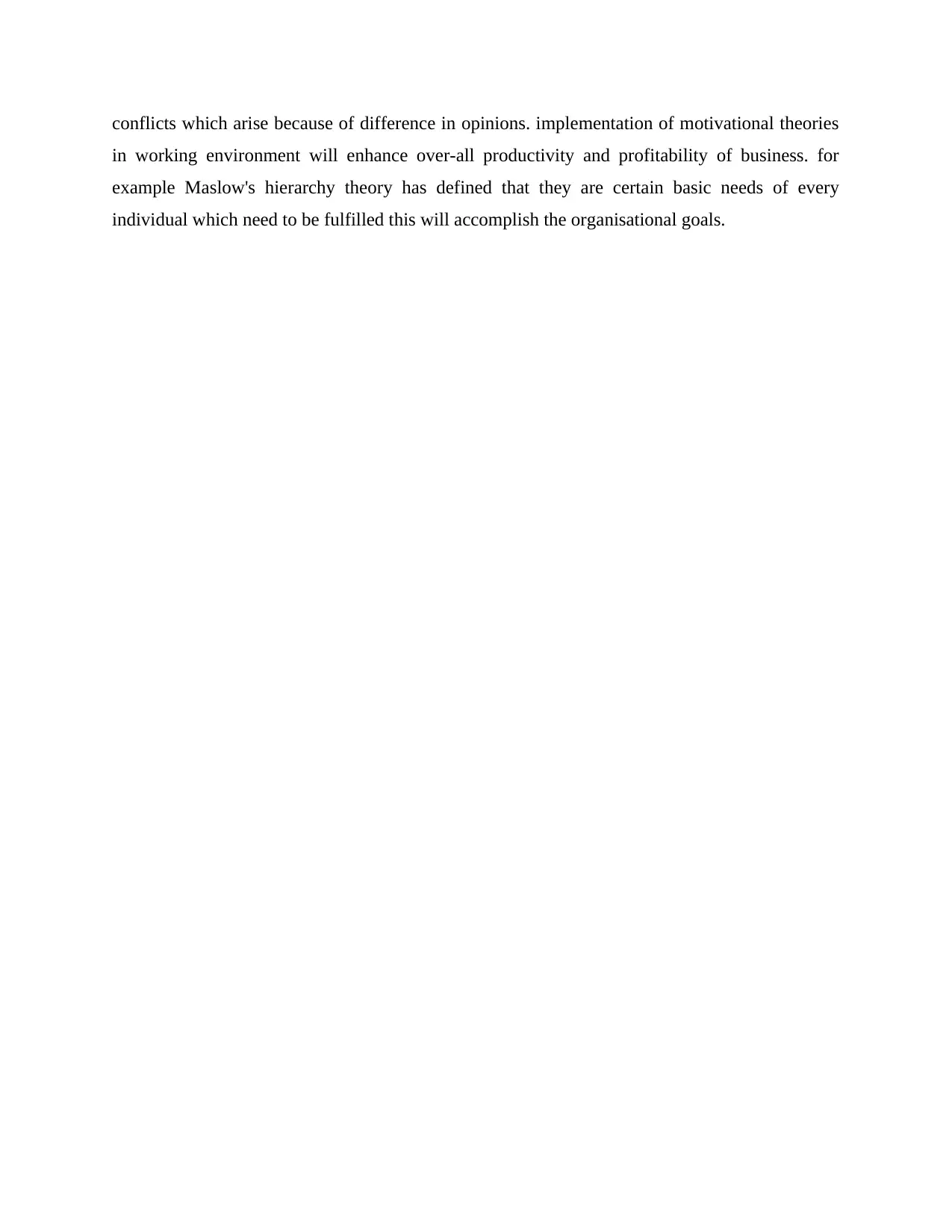
conflicts which arise because of difference in opinions. implementation of motivational theories
in working environment will enhance over-all productivity and profitability of business. for
example Maslow's hierarchy theory has defined that they are certain basic needs of every
individual which need to be fulfilled this will accomplish the organisational goals.
in working environment will enhance over-all productivity and profitability of business. for
example Maslow's hierarchy theory has defined that they are certain basic needs of every
individual which need to be fulfilled this will accomplish the organisational goals.
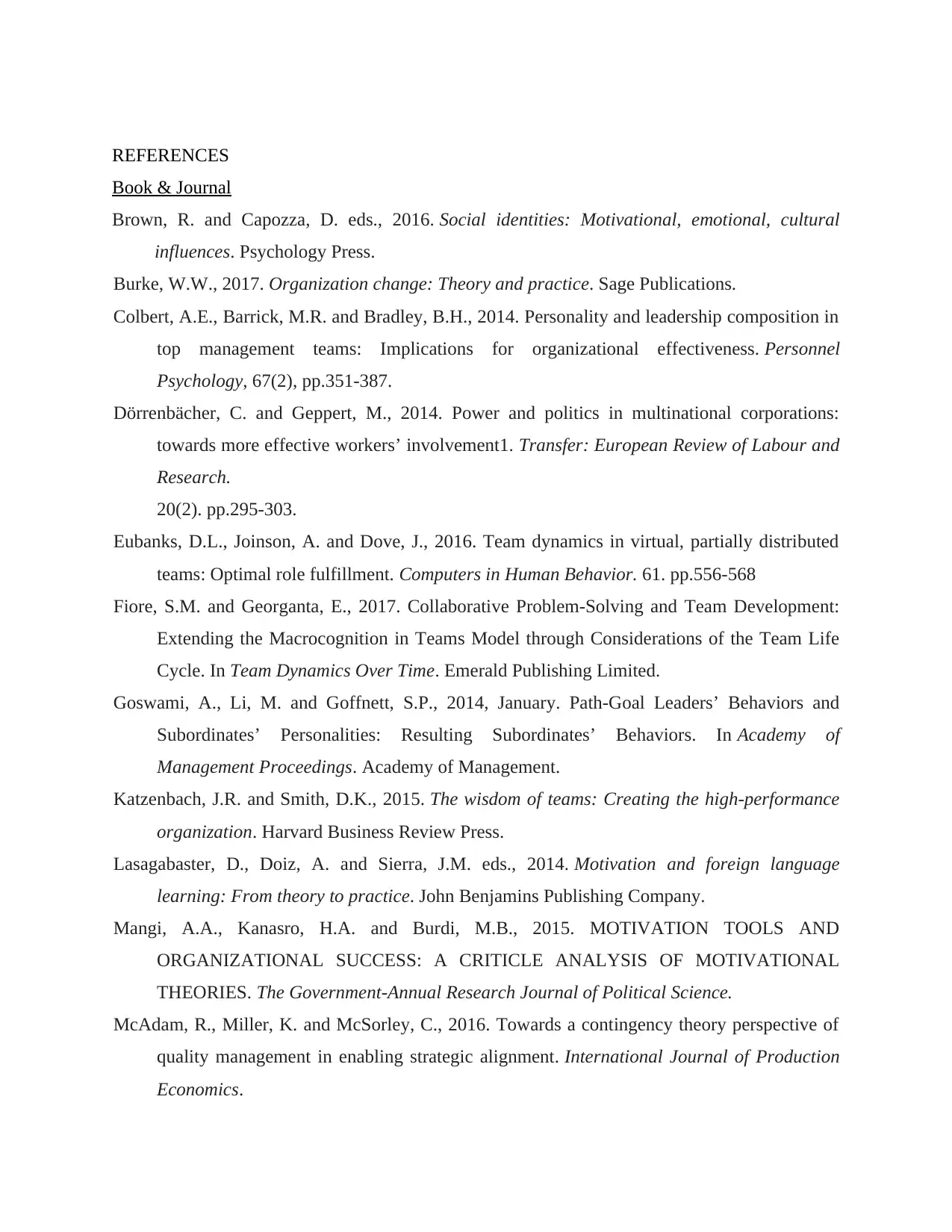
REFERENCES
Book & Journal
Brown, R. and Capozza, D. eds., 2016. Social identities: Motivational, emotional, cultural
influences. Psychology Press.
Burke, W.W., 2017. Organization change: Theory and practice. Sage Publications.
Colbert, A.E., Barrick, M.R. and Bradley, B.H., 2014. Personality and leadership composition in
top management teams: Implications for organizational effectiveness. Personnel
Psychology, 67(2), pp.351-387.
Dörrenbächer, C. and Geppert, M., 2014. Power and politics in multinational corporations:
towards more effective workers’ involvement1. Transfer: European Review of Labour and
Research.
20(2). pp.295-303.
Eubanks, D.L., Joinson, A. and Dove, J., 2016. Team dynamics in virtual, partially distributed
teams: Optimal role fulfillment. Computers in Human Behavior. 61. pp.556-568
Fiore, S.M. and Georganta, E., 2017. Collaborative Problem-Solving and Team Development:
Extending the Macrocognition in Teams Model through Considerations of the Team Life
Cycle. In Team Dynamics Over Time. Emerald Publishing Limited.
Goswami, A., Li, M. and Goffnett, S.P., 2014, January. Path-Goal Leaders’ Behaviors and
Subordinates’ Personalities: Resulting Subordinates’ Behaviors. In Academy of
Management Proceedings. Academy of Management.
Katzenbach, J.R. and Smith, D.K., 2015. The wisdom of teams: Creating the high-performance
organization. Harvard Business Review Press.
Lasagabaster, D., Doiz, A. and Sierra, J.M. eds., 2014. Motivation and foreign language
learning: From theory to practice. John Benjamins Publishing Company.
Mangi, A.A., Kanasro, H.A. and Burdi, M.B., 2015. MOTIVATION TOOLS AND
ORGANIZATIONAL SUCCESS: A CRITICLE ANALYSIS OF MOTIVATIONAL
THEORIES. The Government-Annual Research Journal of Political Science.
McAdam, R., Miller, K. and McSorley, C., 2016. Towards a contingency theory perspective of
quality management in enabling strategic alignment. International Journal of Production
Economics.
Book & Journal
Brown, R. and Capozza, D. eds., 2016. Social identities: Motivational, emotional, cultural
influences. Psychology Press.
Burke, W.W., 2017. Organization change: Theory and practice. Sage Publications.
Colbert, A.E., Barrick, M.R. and Bradley, B.H., 2014. Personality and leadership composition in
top management teams: Implications for organizational effectiveness. Personnel
Psychology, 67(2), pp.351-387.
Dörrenbächer, C. and Geppert, M., 2014. Power and politics in multinational corporations:
towards more effective workers’ involvement1. Transfer: European Review of Labour and
Research.
20(2). pp.295-303.
Eubanks, D.L., Joinson, A. and Dove, J., 2016. Team dynamics in virtual, partially distributed
teams: Optimal role fulfillment. Computers in Human Behavior. 61. pp.556-568
Fiore, S.M. and Georganta, E., 2017. Collaborative Problem-Solving and Team Development:
Extending the Macrocognition in Teams Model through Considerations of the Team Life
Cycle. In Team Dynamics Over Time. Emerald Publishing Limited.
Goswami, A., Li, M. and Goffnett, S.P., 2014, January. Path-Goal Leaders’ Behaviors and
Subordinates’ Personalities: Resulting Subordinates’ Behaviors. In Academy of
Management Proceedings. Academy of Management.
Katzenbach, J.R. and Smith, D.K., 2015. The wisdom of teams: Creating the high-performance
organization. Harvard Business Review Press.
Lasagabaster, D., Doiz, A. and Sierra, J.M. eds., 2014. Motivation and foreign language
learning: From theory to practice. John Benjamins Publishing Company.
Mangi, A.A., Kanasro, H.A. and Burdi, M.B., 2015. MOTIVATION TOOLS AND
ORGANIZATIONAL SUCCESS: A CRITICLE ANALYSIS OF MOTIVATIONAL
THEORIES. The Government-Annual Research Journal of Political Science.
McAdam, R., Miller, K. and McSorley, C., 2016. Towards a contingency theory perspective of
quality management in enabling strategic alignment. International Journal of Production
Economics.
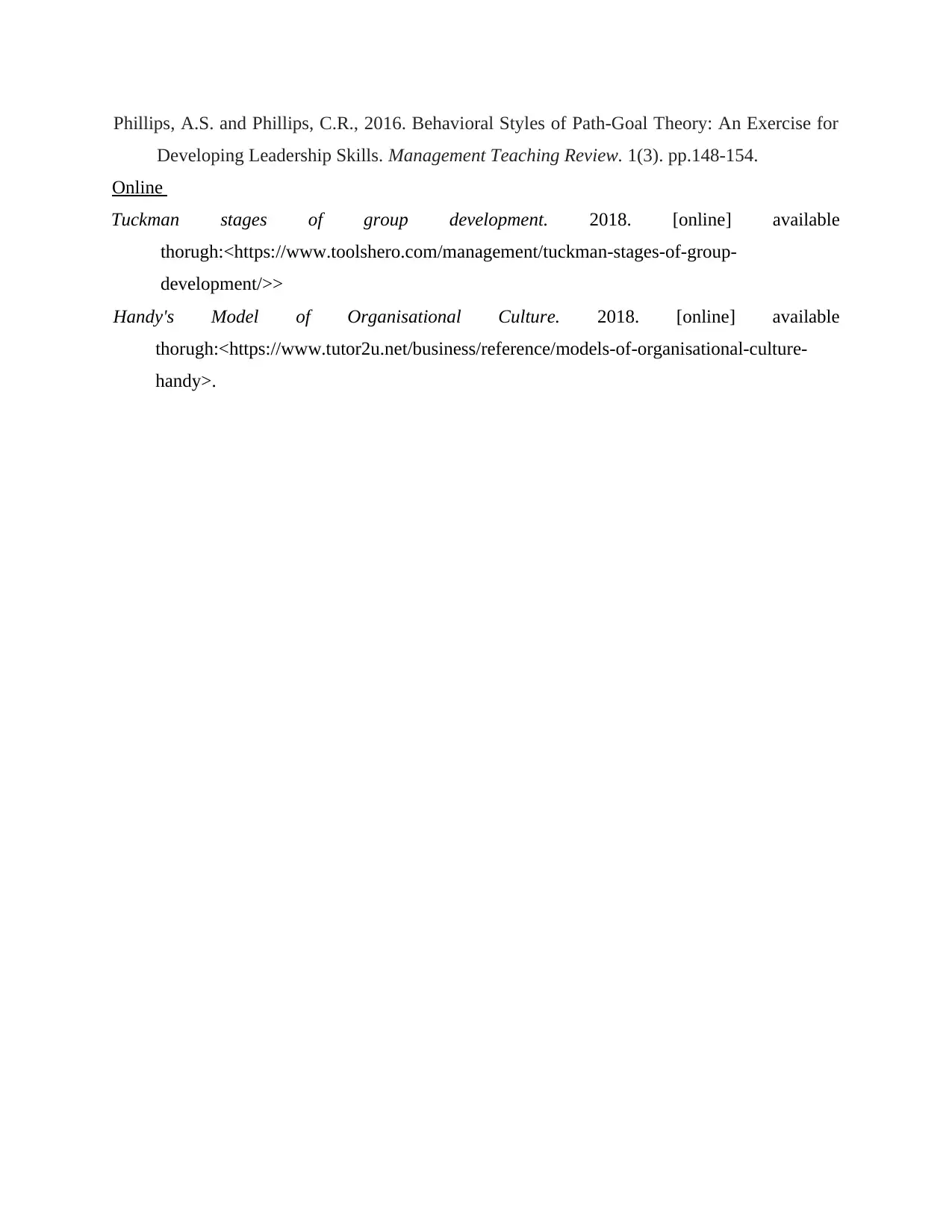
Phillips, A.S. and Phillips, C.R., 2016. Behavioral Styles of Path-Goal Theory: An Exercise for
Developing Leadership Skills. Management Teaching Review. 1(3). pp.148-154.
Online
Tuckman stages of group development. 2018. [online] available
thorugh:<https://www.toolshero.com/management/tuckman-stages-of-group-
development/>>
Handy's Model of Organisational Culture. 2018. [online] available
thorugh:<https://www.tutor2u.net/business/reference/models-of-organisational-culture-
handy>.
Developing Leadership Skills. Management Teaching Review. 1(3). pp.148-154.
Online
Tuckman stages of group development. 2018. [online] available
thorugh:<https://www.toolshero.com/management/tuckman-stages-of-group-
development/>>
Handy's Model of Organisational Culture. 2018. [online] available
thorugh:<https://www.tutor2u.net/business/reference/models-of-organisational-culture-
handy>.
1 out of 16
Related Documents
Your All-in-One AI-Powered Toolkit for Academic Success.
+13062052269
info@desklib.com
Available 24*7 on WhatsApp / Email
![[object Object]](/_next/static/media/star-bottom.7253800d.svg)
Unlock your academic potential
© 2024 | Zucol Services PVT LTD | All rights reserved.





